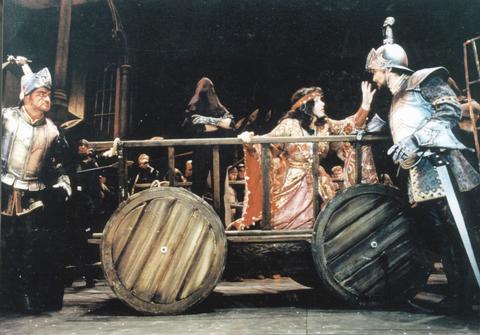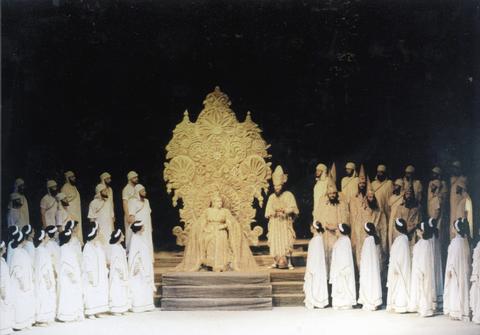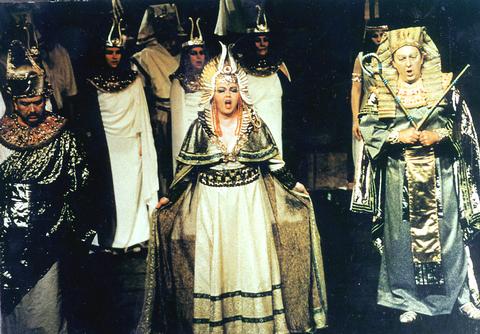What are the long-suffering opera lovers of Taiwan to expect of State Opera Poland? There are two wildly divergent lines of thought, each suggesting a different possible answer.
The first runs as follows. The last few years have seen a veritable pilgrimage of woefully inadequate operatic operations from eastern and southeastern Europe trooping across the stage of the Taiwan National Theater, each one more horrific and pitiful than the last. Taiwan is a highly milkable cash cow for these emergent economies, it seems, but their artistic standards proved far from modern. Are the Poles really likely to be any better?
The second line of thought gives cause for greater optimism. Poland is a country of enormous interest, and with a highly individual artistic tradition. It's a much bigger place than the former principalities and dukedoms, free ports and ethnic enclaves we've seen here of late. Again, the economic motives may be similar, but the talents involved may differ strikingly from those of their predecessors. The Poles might just come up with something special.

The auguries, then, in common with all the best auguries everywhere, are nothing if not ambiguous. Let's look at the facts and see if they can throw any further light on the matter.
State Opera Poland isn't based in Warsaw but in Wroclaw (pronounced "vrotsvov"). This city, under the name Breslau, was German for 400 years prior to 1945 and had strong musical traditions. Today, operatic activity appears vigorous. In addition to their usual program, the city offers every October what they call a "superproduction," with enormous casts, lavish sets, and space for mass audiences.
Each of the three operas we are to see in Taipei has recently been one of these superproductions -- Aida in 1997, Nabucco in 1999, and Il Trovatore in 2000.

PHOTO COURTESY OF NEW ASPECT
Of course, the horrendous expense of touring opera means that numbers have almost certainly had to be cut. There will be only 45 musicians in the orchestra, for instance. Nevertheless, the Poles' chorus numbers 35, and this is a big improvement on the dozen at most seen in the Rigoletto from a benighted US company in the same venue last year.
Another fact may sustain an optimistic analysis. State Opera Poland's advance program announces that their superproductions for 2003 and the following three years will be the four operas of Wagner's Ring cycle.
For anyone to attempt this operatic Himalaya is astonishingly ambitious, and a company that can even contemplate such a venture must be confident of itself, not to speak of its artistic and physical resources. It is inconceivable that the companies from Latvia, Lithuania and Slovenia we've seen here could even dream of such an undertaking.

PHOTO COURTESY OF NEW ASPECT
The Poles' mini-season in Taipei kicks off tomorrow night with Nabucco (1842). This is Italian for Nebuchadnezzar, and it was Verdi's first major success. People more or less went mad when they first heard its explosively energetic music. The story is taken from the Old Testament, and Va Pensiero, a chorus of Hebrew slaves, became so popular it served as a National anthem for the then emerging Italian state. The enormous, weeping crowds that thronged to Verdi's funeral were still singing it 60 years later. The opera opens in Jerusalem, filled with strife then as now, and its story has love and politics clashing head on. It's a work characterized by marches, hymns and grandiose tableaux. Nabucco, King of Babylon, first enters on horseback (it's unlikely we'll see this here). The incredibly forceful choruses, driven by a wild frenzy and accompanied by searing brass fanfares, produced scenes of astonished exhilaration and awe on first hearing.
The middle-period Il Trovatore (The Troubadour) of 1853 is typical of Verdi's most dramatic and vigorous style. Bernard Shaw said that all operas by Verdi were about a tenor who wants to make love to a soprano, and a baritone who objects. This is more or less the situation here, except that in this case the baritone objects because he wants her himself. The tenor has been carried off as a baby by the mezzo-soprano, a gypsy. He thinks he's her son and becomes a humble troubadour. The baritone, who is in reality his brother, is a powerful aristocrat, however, and eventually has the tenor executed. This act of fratricide is considered revenge by the gypsy as long ago her mother had been burnt alive as a witch by the same family.
Basically the opera is a series of extraordinarily rumbustious and forceful arias and choruses. Once again, its dominant quality is excitement, what the critic Peter Conrad called its "contagious insanity." Italy had never heard anything as flagrantly melodramatic. It has one chorus accompanied by hammering on anvils, plus the famous Miserere scene, one of the best known moments in all opera.
Aida represents Verdi's later, though not his last, style. It's set in ancient Egypt and was commissioned for the opening of the Suez Canal. It premiered in Cairo in 1871.
The opera can be viewed as politically inappropriate love stifled by hierarchical oppression. (The lovers end by being walled up alive, still singing as they die from lack of air). Once again there's a massive on-stage procession, and we'll probably see the old trick of the same singers coming back on stage time and time again to flesh out the numbers.
In addition, the company is presenting a program of operatic scenes, fully staged and in costume, on Feb. 22, replacing the performance of Verdi's Requiem previously advertised.
This newspaper has frequently asserted that the best Western opera available in Taiwan is the locally-generated variety. The Taipei Symphony Orchestra's Madama Butterfly last September, for instance, was superb. Imported companies tend, by contrast, to be not of the best quality. Yet there's always the possibility that they will deliver something remarkable and unexpected.
One strategy would be to treat yourself to an educational experience. With an early, a middle-period and a relatively late Verdi work on offer, the visit could be regarded as a pocket guide to the music of Italy's greatest operatic composer. There are, incidentally, special packages available if you buy tickets for all three operas at the same time (see below).
Throughout their history the Poles have been adept at fighting against the odds. I was in Wroclaw in 1979, and again in 1981, both times in the communist era. The theater festivals I was attending were dominated by avant-garde groups whose dissident political message was largely hidden by their artistic obscurity. But there was tremendous enthusiasm everywhere, and it was obvious what an extraordinary people the Poles were, glamorous even under appalling economic conditions. Things are apparently a lot better now, though it must still be an uphill struggle.
I attended a traditional show in what is probably this company's usual base, a medium-sized, classical theater. It was enjoyable largely because it was so exceptionally old-fashioned. Poland was the nearest I have ever been to being in a time capsule. Under the communists you couldn't open even a barber's shop without the party hierarchy's permission. As a result, nothing appeared to have changed since the Russians took over in the 1940s. This had its own curious charm, at least for outsiders. And the organizers have stated that what we are to see in Taipei will be "rather traditional" productions. The advance photos bear this out. It seems a pity that the less well-placed opera companies don't seize the opportunity to make a dramatic breakthrough in production techniques.
Innovative high-tech productions, for instance, don't need to be expensive and, with the addition of shamelessly amplified sound, the effect of grand opera could be achieved without the huge numbers of participants usually required. This is the way opera is bound to go sooner or later. Why don't these smaller operations seize the initiative and become ground-breaking pioneers?
History has often shown progress coming from people in a tight fix making a virtue of necessity. The Poles, and others like them, could vault into the forefront in this way, and as a bonus earn themselves a place in the history books.
So, are this month's visitors worth a try? On balance it seems right to give them the benefit of the doubt. With such an ambitious program, the signs are that the indomitable Polish spirit could well win through.

May 18 to May 24 Pastor Yang Hsu’s (楊煦) congregation was shocked upon seeing the land he chose to build his orphanage. It was surrounded by mountains on three sides, and the only way to access it was to cross a river by foot. The soil was poor due to runoff, and large rocks strewn across the plot prevented much from growing. In addition, there was no running water or electricity. But it was all Yang could afford. He and his Indigenous Atayal wife Lin Feng-ying (林鳳英) had already been caring for 24 orphans in their home, and they were in

President William Lai (賴清德) yesterday delivered an address marking the first anniversary of his presidency. In the speech, Lai affirmed Taiwan’s global role in technology, trade and security. He announced economic and national security initiatives, and emphasized democratic values and cross-party cooperation. The following is the full text of his speech: Yesterday, outside of Beida Elementary School in New Taipei City’s Sanxia District (三峽), there was a major traffic accident that, sadly, claimed several lives and resulted in multiple injuries. The Executive Yuan immediately formed a task force, and last night I personally visited the victims in hospital. Central government agencies and the

Australia’s ABC last week published a piece on the recall campaign. The article emphasized the divisions in Taiwanese society and blamed the recall for worsening them. It quotes a supporter of the Taiwan People’s Party (TPP) as saying “I’m 43 years old, born and raised here, and I’ve never seen the country this divided in my entire life.” Apparently, as an adult, she slept through the post-election violence in 2000 and 2004 by the Chinese Nationalist Party (KMT), the veiled coup threats by the military when Chen Shui-bian (陳水扁) became president, the 2006 Red Shirt protests against him ginned up by

As with most of northern Thailand’s Chinese Nationalist Party (KMT) settlements, the village of Arunothai was only given a Thai name once the Thai government began in the 1970s to assert control over the border region and initiate a decades-long process of political integration. The village’s original name, bestowed by its Yunnanese founders when they first settled the valley in the late 1960s, was a Chinese name, Dagudi (大谷地), which literally translates as “a place for threshing rice.” At that time, these village founders did not know how permanent their settlement would be. Most of Arunothai’s first generation were soldiers